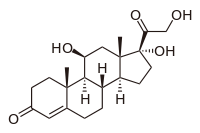
Photo from wikipedia
The pathophysiological mechanism underlying Graves' disease (GD) remains incompletely understood. Inhibitory receptors on B cells are critical for humoral immunity, which plays a key role in GD pathogenesis. This study… Click to show full abstract
The pathophysiological mechanism underlying Graves' disease (GD) remains incompletely understood. Inhibitory receptors on B cells are critical for humoral immunity, which plays a key role in GD pathogenesis. This study aimed to investigate B cell subsets distribution and inhibitory receptor expression on these subsets in GD patients. Peripheral blood was drawn from 41 healthy controls and 46 GD patients (21 patients with moderate GD, 25 patients with severe GD). B cell subset distribution and CD22, CD32b and CD72 expression on B cells were analyzed by flow cytometry. Serum cytokines were examined by enzyme-linked immunosorbent assay (ELISA). Compared with healthy controls, the naïve B cell percentage was increased, while the preswitched memory and conventional memory B cell percentages were decreased. The inhibitory receptors expression, especially CD32b, on B cell subsets was significantly decreased in patients with GD. In addition, the inhibitory receptors expression on B cell subsets from severe GD patients exhibited a decreasing trend compared with those from moderate GD patients. These results suggest that abnormal B cell subset distribution occurs in GD. Impaired inhibitory receptors, in particular CD32b, play a crucial role in GD pathogenesis and might be a therapeutic target to rebuild self-immune tolerance in GD.
Journal Title: Human immunology
Year Published: 2021
Link to full text (if available)
Share on Social Media: Sign Up to like & get
recommendations!